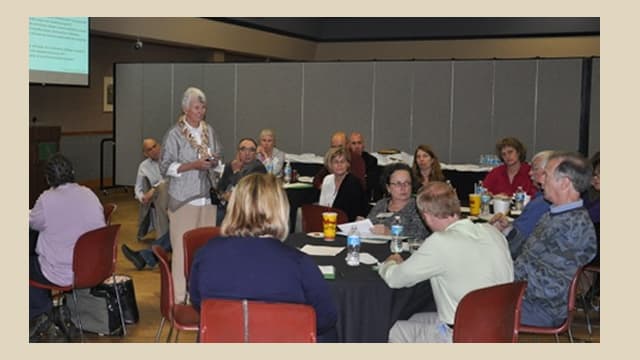
Declining civility among higher education faculty was cited as a concern this year by an Inside Higher Education survey of college/university chief academic officers. According to the results, 27 percent of provosts were “very concerned” and 44 percent were “somewhat concerned.” The results from a recent climate survey administered to UNC Charlotte faculty by the ADVANCE Faculty Affairs and Diversity Office indicated that some faculty reported experiences that echoed these concerns.
The workshop “Dealing with Disruptive Conduct in the Academy” was held recently as a proactive response to these national and local concerns. Organized by the Committee on the Future of the Faculty, the full-day workshop was supported by the Provost’s Office and ADVANCE. It was endorsed by the Council of Deans.
Workshop participants were introduced to the continuum of disruptive conduct, which can range from micro-aggressive behaviors, such as eye rolling, dismissive gestures and sarcastic comments, to more extreme behaviors that include public criticism, degradation, personal attacks and intimidation.
“Participants learned about the negative impacts such behaviors can have on the target, which can include anger, hurt, frustration and in more extreme scenarios, feelings of disempowerment, isolation, decreased productivity and even moving to a different institution,” said Yvette Huet, ADVANCE director. “Disruptive behaviors among faculty members can adversely impact not only the target of these behaviors but the campus environment and the culture of the institution.”
Barbara Butterfield and Jane Tucker, Ph.D.s, facilitated the workshop. Butterfield, who has more than 35 years of experience in higher education, is executive consultant to the University of Michigan, senior consultant to the Segal Corporation and a consultant educator for COACh through the National Science Foundation. COACh is a grass-roots organization that is working to increase the number and career success of women scientists and engineers through innovative programs and strategies. Tucker, president of Jane Tucker and Associates, has more than 25 years of experience in leadership development, executive coaching and teaching problem-solving skills in the public and private sector. She is a consultant educator for COACh, too, and recently retired from the Center for Creative Leadership in Greensboro.
Butterfield and Tucker provided a number positive solutions to deal with disruptive conduct in the academy. Participants learned that feedback should be balanced and honest. They also were introduced to the SBI Feedback Model, which was developed by the Center for Teaching and Learning. SBI is simple and direct – a person captures and clarifies the situation, describes the specific behaviors and explains the impact that another individual’s behavior had. It is used for giving both positive and negative feedback. These, and other strategies were illustrated using role play or by working through case studies in small groups.
“This was a first-class workshop offering recent higher education case studies as a basis for teams to discuss and problem solve. Participants came away with a greater sense of clarity for when, why and how to take a stand if they witness disruptive conduct,” said Lori McMahon, associate provost for academic budget and personnel. “We are a values-driven community of faculty, staff students and administrators, and we need and deserve resources and tools to help us move forward and minimize diminishing others in our human-educational enterprise. I’m very appreciative that our campus provides such quality services.”